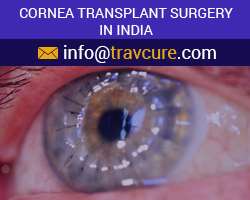Safe & Affordable Cornea Transplant Surgery in India with Travcure Medical Tourism

The clear outer layer in front of the eyeball is known as cornea. Acting as a window for the eye, the colored iris with pupil at the center can be seen through cornea. Cornea enables focus light rays onto the retina, which then transmits images to the brain. Therefore when cornea is damaged, its shape may change or it might become less transparent. This condition will eventually result in preventing light from reaching the retina & subsequently cause transmitted pictures to brain be unclear & distorted.
What is Cornea Transplants?
Corneal transplant is also known as Keratoplasty. It is a surgical procedure which is meant to replace parts of cornea from donor tissue. This dome-shaped transparent surface from eye accounts for a large part of eye’s power of focusing. Corneal transplant can reduce pain, restore vision & greatly improve appearance of diseased or damaged cornea. Most corneal transplant procedures prove to be successful, though they carry a small risk of complication resulting from rejection of donor cornea.
When Do You Need Corneal Transplant Surgery?
Corneal transplant surgery is most often performed so as to restore vision to persons having damaged cornea. This transplant surgery may also relieve pain & other symptoms & signs normally associated with diseases of cornea.
A variety of conditions that can be effectively treated with corneal transplant surgery include –
- Fuchs’ Dystrophy
- Keratoconus – Cornea Bulging Outward
- Thinning of Cornea
- Corneal Scarring Caused by Injury or Infection
- Clouding of Cornea
- Swelling of Cornea
- Corneal Ulcers – Including Ones Caused by Infections
- Complications Caused by Prior Eye Surgeries
Corneal Transplant Procedures
Type of corneal transplant required for treatment will depend upon which part of cornea is damaged & how much of cornea is needed to be replaced. Normally, there are three options available for cornea transplants which include Penetrating Keratoplasty (PK) & which is a full thickness transplant, Deep Anterior Lamellar Keratoplasty (DALK) which replaces or reshapes outer & middle layers of cornea & Endothelial Keratoplasty (EK) which replace the deeper back layers of cornea. Typically performed under general or local anesthesia, cornea transplants usually take less than an hour, depending upon the circumstances. Most patients wither leave clinic the same day or in some cases stay overnight.
Finding Donor Cornea
Most donor cornea used for transplants come from deceased donors. Unlike liver or kidneys, donor cornea is easily available & patients will not have to endure long waits. This is because many people specifically request their corneas be made available for donation after death. This is quite possible unless in certain cases where donors are found to be suffering from eye conditions & infections.
After Cornea Transplant Surgery
After cornea transplant surgery is complete, patients can expect to receive several medications like eye-drops & oral medications occasionally. This may continue throughout recovery & will help you control pain, swelling & infection. Some patients may be asked to wear an eye patch in order to protect the eye after surgery. Plan to take it easy & protect eyes from injury while slowly working your way up to normal activities including exercise. Make it a point to return for frequent follow-up exams where eye specialists will look for any complications during the first year after surgery.
Corneal Transplant Results
Most patients receiving cornea transplants will have vision at least restored partially, & which is largely depending upon your reasons for surgery. At times vision may initially be worse than it was before surgery as the eye takes time to adjust to the new cornea. In cases this may take several months for vision to improve. Once outer layer of cornea is healed, which may take several weeks or months after surgery, the eye-specialist will then make final adjustments so as to improve vision. These include correcting unevenness in cornea (astigmatism) & revising vision problems like refractive errors like nearsightedness or farsightedness with glasses or contact lenses or even laser eye surgery in some cases.
Risks of Corneal Transplant Surgery
Although corneal transplant surgery is relatively safe, there is a small risk of serious complications including –
- Eye Infection
- Cataract – Clouding of Eye Lenses
- Glaucoma – Increase of Pressure Within Eyeball
- Problems with Stitches – used to Secure Donor Cornea
- Rejection of Donor Cornea
- Swelling of Cornea
Symptoms of donor cornea rejection generally include pain, redness, loss of vision & sensitivity to light. Rejection of donor cornea normally occurs in about 20% of cornea transplant recipients.
Benefits of Corneal Transplant
Success rates of cornea eye transplants as treatment for corneal dystrophies is pretty high. Dystrophy should have caused serious sight loss for this graft to be considered as an option. Cornea transplants offer a great opportunity for eye-sight to return to normal vision. After all, the primary benefit of corneal transplantation surgery is to restore total vision.
Cornea Eye Transplant in India With Travcure Medical Tourism
Travcure medical tourism consultants are associated with the best cornea transplant doctors in the country. Without compromising on quality, cost of corneal transplants in India is much lower than what you would normally pay in other developed countries around the world. Cornea transplant in Bangalore city is one of the most affordable options which Travcure healthcare consultants would gladly arrange for you.
For More Information Please Contact Us At:
Travcure Medical Tourism Consultants
Email: [email protected]
Call us for appointment:- +918600044116
Visit us at: https://travcure.com
Follow us at:
https://twitter.com/Travcuremedtour
https://plus.google.com/+TravcureMeditourism
